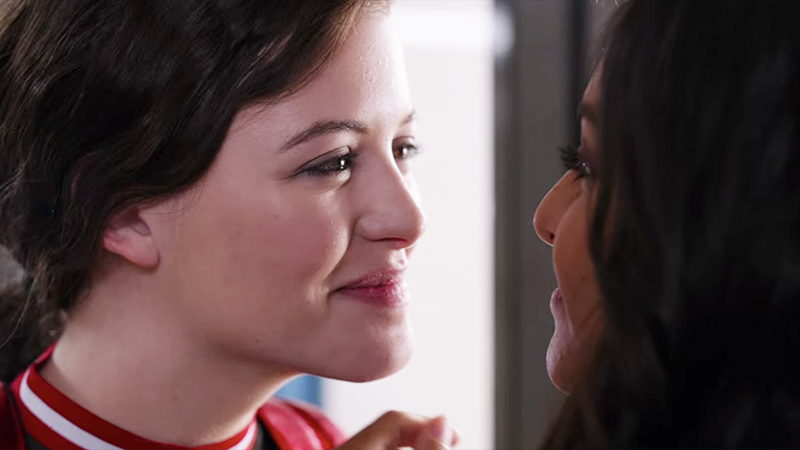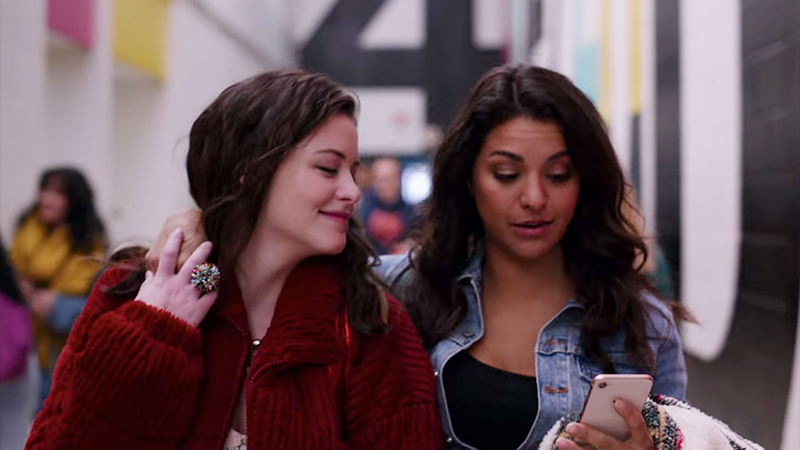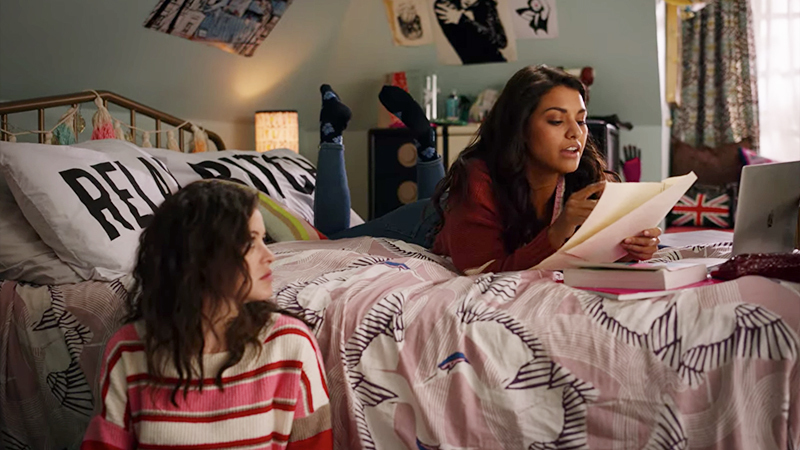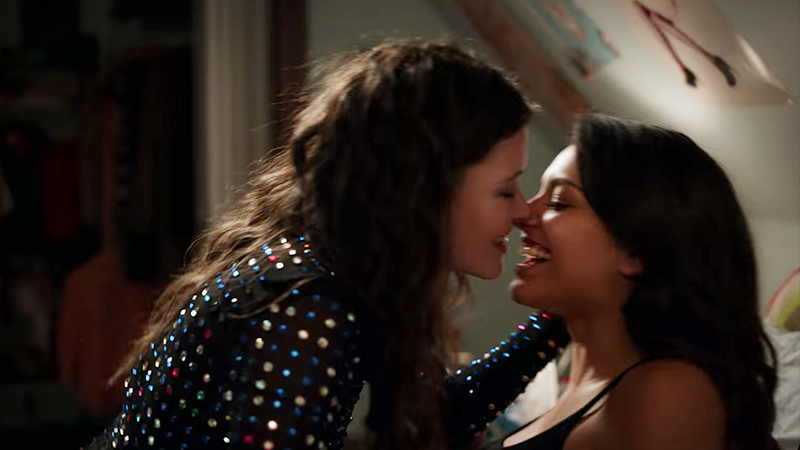In a still rare but slowly rising trend, Ginny & Georgia’s lesbian storyline adopts the Gen Z method of teenagers coming out — which is to barely do it at all. Despite being 15, Maxine “Max” Baker has been out to her family and friends for years. Her mother says they found out by way of complimenting Barbie’s boobs, but that’s the last we hear of Max’s “coming out” — she’s known she’s a lesbian for a long time and while she has plenty of other questions and problems, her sexuality isn’t one of them. This lack of a coming out storyline is becoming more and more prevalent and it leaves so much more space to tell the stories that take up the majority of our lives, since for most of us, whether our coming out story was positive, negative, or somewhere in between, it’s just a small part of our lives.
Before I delve into Max’s story, let me give you an overview of the show’s general plot. Ginny is the daughter of former teen mom Georgia, a woman who is as clever as she is gorgeous and knows how to manipulate just about every situation to her advantage, a skill she learned out of necessity. Georgia has moved Ginny and Ginny’s half-brother Austin from town to town for years before settling in a Massachusetts suburb, much to Ginny’s chagrin. The show is marketed as a modern day Gilmore Girls, but while the show is about a young mom and her teenage daughter in a New England city with a small-town mentality, that’s about where the similarities end. It has just as much Desperate Housewives and Mean Girls, with maybe a dash of One Tree Hill, a pinch of Big Little Lies and a splash of Degrassi.
Okay that last one might just be because local coffee shop owner Joe is played by Raymond Ablack aka Sav. (In fact, the whole show is dotted with Canadian faves, like Jennifer Robertson from Schitt’s Creek, Kelly McCormack who played queer mechanic Zeph on Killjoys, and more.) But also, not unlike Degrassi, they tackle a lot of Big Topics like race, self-harm, sexual assault, etc, and while not nearly as After School Special as some teen dramas, it definitely has a Hot Button Topic feel to it at times. Overall, the cast was fairly diverse and Max’s dad was Deaf so a lot of characters spoke ASL, all things that were addressed to varying degrees of success. As a white hearing person, I can’t speak to the POC or Deaf representation — though POC critics and Deaf critics have — but as someone who has had experiences with sexual assault and self-harm, I thought some of the language around those topics in particular was thoughtful and relatable.
Sabrina Reed at Fansided summed up a lot of the criticism about the show when she wrote that the Ginny & Georgia failed Ginny as a Black biracial lead by “playing footsie” with the narrative that only addressed Ginny’s race when it centered on the struggles of being a person of color, while also refusing to give Ginny Black friends.
Many Deaf viewers seem really pleased that Clint was played by Deaf actor Chris Kenopic, who it seem got his start acting when he starred in a viral Hershey’s commercial in Caanda 2019! The Baker family signed so Clint could be included in all the family’s conversations.
When the show wasn’t touching on topics like these, it was fun and quick and interesting and I found myself just as intrigued with the adults’ storylines as the teens’ storylines, which is a rare find for me. It’s imperfect, of course (I don’t want to talk about the Taylor Swift drama, it’s eye-rolly on both sides) but it was a fast, fun watch. Ginny and Georgia are brilliantly acted by up-and-coming Antonia Gentry and Brianne Howey (aka Reagan from Batwoman) respectively, their chemistry flowing naturally whether their scenes involve them being hilarious friends, tense enemies or a loving mother and daughter pair.
HOWEVER we are here today to discuss Max, played by Sara Waisglass, who has been open about liking girls since she was nine and is bursting with energy that she simply cannot contain inside her so it comes tumbling out of her mouth in the form of rapidfire questions, comments, and random unrelated thoughts.
(By the way this is your final spoiler warning; I’m going to get into more specific details about Max’s journey, so if I haven’t convinced you to give it a go yet, keep reading, if I have, stop now and come back when you’re done.)

Max’s friends, Abby and Norah, tease her for being immediately drawn to the new girl Ginny, but Max laments that there aren’t enough girls at their school for her to crush on. Abby and Norah ask her about the one other known lesbian in the school and Max says what I’ve had to say to countless straight people in my long gay life, “Just because she’s gay doesn’t mean I want to hook up with her.” Then she says the girl “puts the yike in dyke” which I am absolutely stealing.
Other relatable moments include but are not limited to her being a horny teen who might only be attracted to girls but will make out with anyone who asks (aka me in college), having even her most supportive friends turn the volume of their voice down when they say “gay” as if it’s a bad word and having to call them on it, having a crush on a straight girl (who, hilariously enough, is played by Devyn Nekoda who is one half of the queer ship on Utopia Falls with someone else who will show up in just a minute), having to pretend you’re okay when you’re not and more.
And then one day, heartbroken and overwhelmed, Max storms into the auditorium to be alone with her feelings and sees Sophie, played by out queer actress Humberly González (you guessed it, the other half of aforementioned Utopia Falls ship.)
Max spews her feelings all over the unsuspecting senior girl and Sophie takes a page from Arizona Robbins’ book and tells her that she’s hot and that next time she should kiss someone who wants to kiss her back.
Max quickly gets in her own head and all her self-assuredness falls away when Sophie is nearby. She watches Norah and Abby drunkenly make out to impress the boys at a party and at first is rightfully grumpy about it, but a few drinks in she thinks maybe this is how she can get Sophie to kiss her, too.
Needless to say it doesn’t go well.
Eventually though they make up and Max gets to try her hand at having a girlfriend for the first time. Sophie teaches Max some Spanish, Max teaches Sophie some ASL, it’s all very cute and sweet.

I won’t spoil too much else about how Max’s story plays out, but two things stood out to me, one bad and one good. The bad one is something that happens on TV shows so often I genuinely don’t even think they realize they’re doing it, but one of the most tender scenes between Max and Sophie cuts immediately from them to a straight couple kissing. I think editors just love a kiss-to-kiss transition, but when time and time again I notice it going immediately from girls kissing to a boy and girl kissing, it starts to feel like they’re saying, “Hey forget about that gay stuff, look over here now.” Again, I don’t think it’s always intentional, but it happens enough that I notice it and have considered starting a spreadsheet to keep track of how often it happens. (I have a spreadsheet problem, someone please stop me.)

The good thing, however, is that Sophie is bisexual and we learn this during a lunch period when Max is worried about living up to Sophie’s exes, a girl Sophie lifeguarded with an a boy named Ben. Max doesn’t feel any type of way about the fact that Sophie has dated both boys and girls as much as she is stressed that her exes are hot and badass and Max doesn’t even have any exes and she’s worried she won’t measure up.

Unlike some other shows, their kisses aren’t stolen in the dark, they’re shared with smiles and in soft, bright daylight and overall it’s a very cute story and even though teen drama rears its ugly head, as teen drama is wont to do, I appreciated having a queer story nestled so neatly into the fold. It was really refreshing to see a pretty typical first relationship/”first time” storyline be so queer and done with such care, both by the writers and by the actresses.
Support Independent Queer Media
We’re raising funds to make it through the end of July. 99% of the people who read this site don’t support. Will you be one of the ones who do? Joining A+ is one of the best ways to support Autostraddle — plus you get access to bonus content while keeping the site 99% free for everyone. Will you join today?








Comments
Yay for this review!!
okay so spoiler warning and trigger warning (reference to sexual abuse):
no reviewers as talked about it so i am wondering if somehow i read this wrong but did you all also read the dead stepfather as being creepy towards ginny (how he touched her when she was doing yoga) and that georgia murdered him for that, not only for the money (i say not only, i do think it was in part about the money^^). Big HTGAW vibes IMO.
Yeah that’s 100% why she decided to kill him that morning. She wasn’t going to wait for him to do something worse.
I loved this show at first, but the white mom called the cops on her Black daughter and it was played as a good parenting move. To me, there’s no coming back from that.
100% agree that was fucked up, and Georgia was so smug about it. I’m not sure it was played as a good parenting move though. Like it’s hard for me to tell what’s the show’s take on Georgia’s parenting really. I think it lets it be messy, and I really like that. There’s a few places where she just does not make the right call… the main one being when she calls the cop, or when she’s encouraging a white boy to solve his problem with violence… but I’m not sure the show is on her side in either of those instances.
THIS. All of the upsetting bullshit in this show, this was the worst. This behavior should have been called out by someone in the show as her throwing her daughter to the wolves. There were good things about the queer relationship in this show, but I don’t know if it was worth all the other nonsense I had to watch.
I thought this series was entertaining enough. But perhaps they tried to fit in too much into 10 episodes. As a result, some topics were dealt with a bit more superficially than they deserved. An example would be the implications of Ginny’s biracial identity. While they didn’t ignore the issue (it came up in almost every episode), I could see why some would criticize that it was given a somewhat superficial treatment.
I don’t think you mentioned this, but Sara Waisglass also got her start on Degrassi. Her character was straight on that show, but was very supportive of her brother when he came out as bi and got a lot of flack from their parents about it.
I think things will be better if people will stick to the god given gender. Being yourself is better than trying something you are not. Don’t change that.
moderators please remove this comment.
Moderators please remove this comment